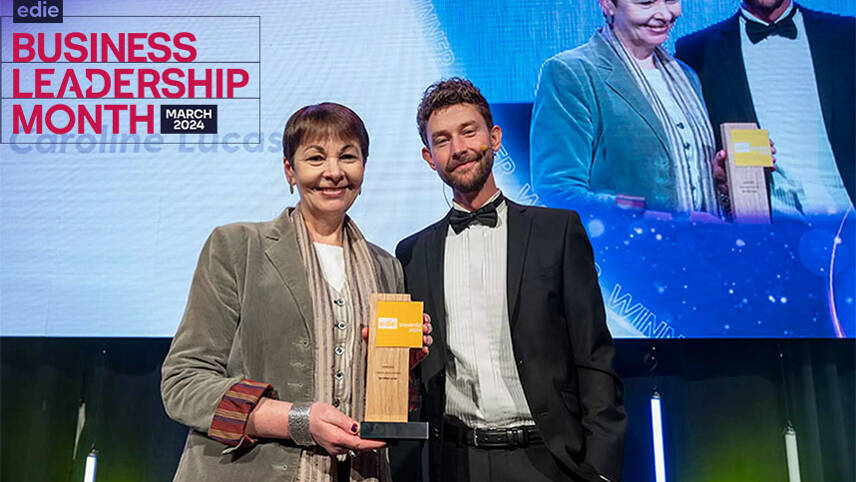Register for free and continue reading
Join our growing army of changemakers and get unlimited access to our premium content
Lucas, a two-time leader of the Green Party and a leading voice in UK progressive politics, delivered the opening keynote address to a packed ballroom of nearly 700 business leaders at the edie Awards in London last week.
She was also honoured with the prestigious ‘Lifetime Achievement Award’ during the event, joining the likes of Paul Polman, Rachel Kyte, Dame Polly Courtice and Jonathon Porritt.
Lucas began her speech by emphasising her ongoing commitment to addressing challenges faced by humanity today and speaking truth to power. For this, Lucas urged business leaders to join her and collectively rise to these challenges to ensure a better future for humanity and the planet.
Here, we outline three key recommendations from Lucas for the business sector:
1). Don’t adapt, lead the charge
Lucas stressed the need for businesses to not only adapt but to take a leading role in fostering sustainability.
Despite the absence of a predictable regulatory framework to integrate sustainability into business models, Lucas commended several businesses for making the transition amidst this uncertainty.
She emphasised moving beyond traditional profit-driven business models to actively contribute to the betterment of the environment, communities and workers, while advocating for a comprehensive approach to embed sustainability into everything from board composition to governance and ownership.
Lucas said: “Business leadership in today’s world has to be about more than redesigning products though, or green capitalism.
“It demands going beyond simply doing no harm and instead to actively doing good.”
While urging businesses to become givers, creators and sharers rather than mere takers, Lucas highlighted that several businesses are already advocating for necessary policy regulation to catalyse climate action.
More than 2,500 businesses are currently supporting the Better Business Act, which aims to change UK law to ensure every company in the UK aligns the interests of their shareholders with those of wider society and the environment.
Lucas added: “To really change the business environment for the better, we need to see businesses legally responsible for benefiting workers, customers, communities and the environment in the widest sense, as well as delivering profit.
“This is the future of business in a thriving economy on a thriving planet, and I urge you to create this new reality.”
2). Give the future a voice in boardrooms
To create this new reality and truly integrate sustainability into every aspect of the business model, Lucas emphasised the criticality of integrating the viewpoint of future generations into boardroom deliberations.
She cited Wales as an inspiring example, where the Well-being of Future Generations Act mandates public bodies to consider the long-term impacts of their decisions, while the role of the Future Generations Commissioner acts as a guardian for the well-being of future generations.
Additionally, Lucas praised companies like Faith in Nature for appointing independent guardians, such as environmental lawyers, to advocate for nature in decision-making processes.
She said: “Only by genuinely bringing the future into the room can you possibly fulfil the responsibilities we all have for making the future liveable.
“So step aside, let go of some of your power and your platforms, and instead turn the words of intergenerational justice into deeds.”
Lucas urged businesses to let go of some authority and influence, giving platforms to future voices and transforming the principles of intergenerational justice into practical steps for a sustainable future.
3). Escape the trap of endless growth
Lastly, Lucas underscored the imperative for businesses to shift away from the outdated and unsustainable endless growth model that has prevailed since the 1930s.
Lucas believes that GDP is an inadequate metric for measuring value, citing examples where factors like healthcare revenue from illness can positively impact GDP.
She said: “GDP is a rubbish metric for measuring what’s valuable. Oil and gas extraction pushes GDP up, whilst simultaneously pushing us closer to the precipice of climate breakdown.”
Additionally, Lucas critiqued the assumption underpinning ‘green growth,’ highlighting the unattainability of full decoupling of economic growth from environmental harm at a rapid and large scale.
Referencing the UN global assessment of nature, she emphasised the role of global economic growth, especially material consumption in affluent nations, as a major driver of deadly ecological trends.
Lucas added: “Pioneering business leaders like Paul Polman know this already. He warns that the way we continue to define GDP is creating problems faster than the solutions we are implementing – and that the gap is actually increasing.”
In proposing alternatives to GDP measurement, Lucas suggested focusing on indicators like well-being, inequality, nature restoration, literacy rates for girls and overall happiness to measure true value.
Lucas urged businesses for a collective departure from the fixation on perpetual growth, advocating for a positive and productive approach that operates within the Earth’s life-sustaining boundaries.
Discover the winners of the edie awards here, and delve into our case studies here to uncover the accomplishments of each winner and the distinguishing factors that caught the attention of our judges.



Please login or Register to leave a comment.